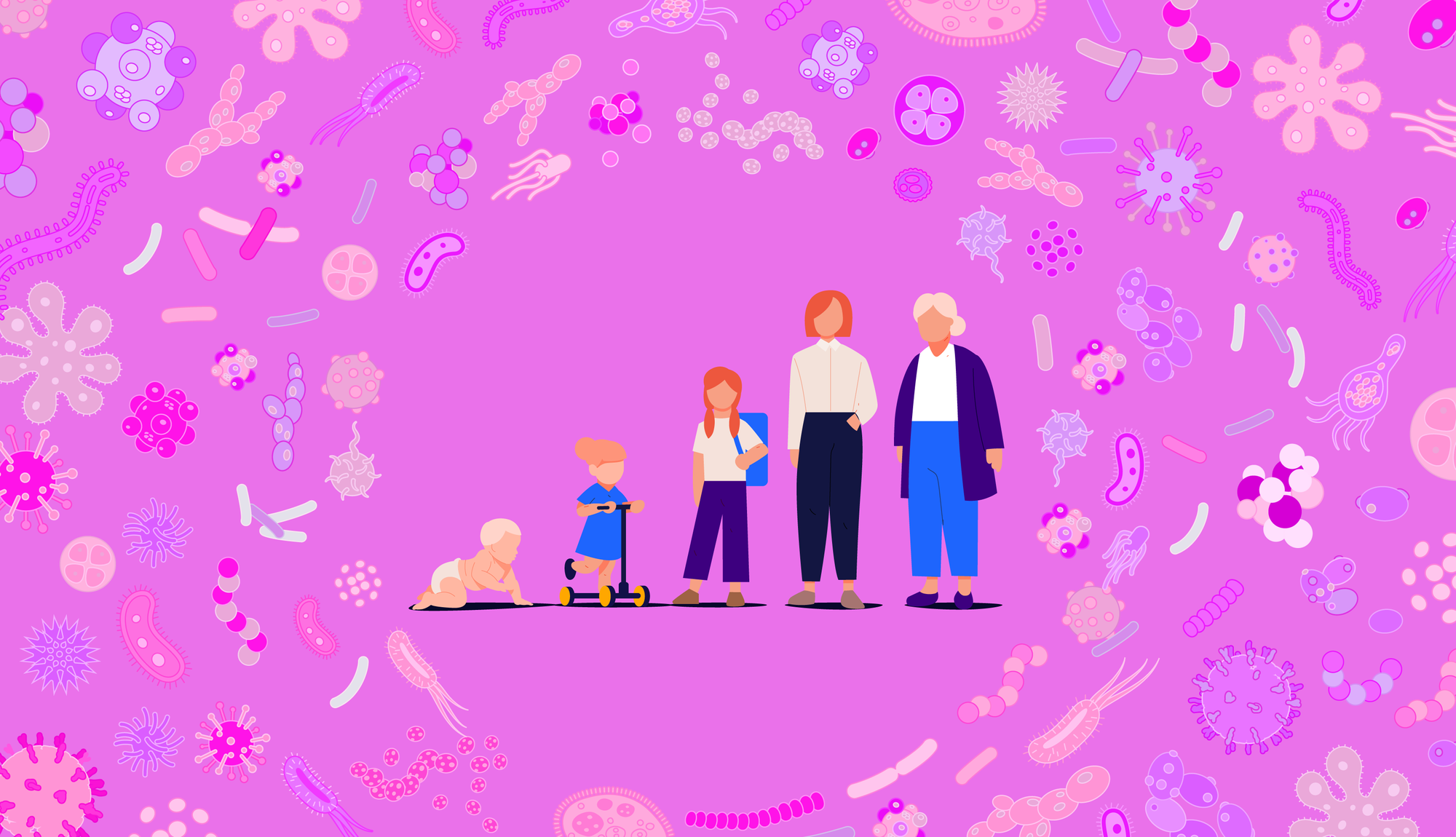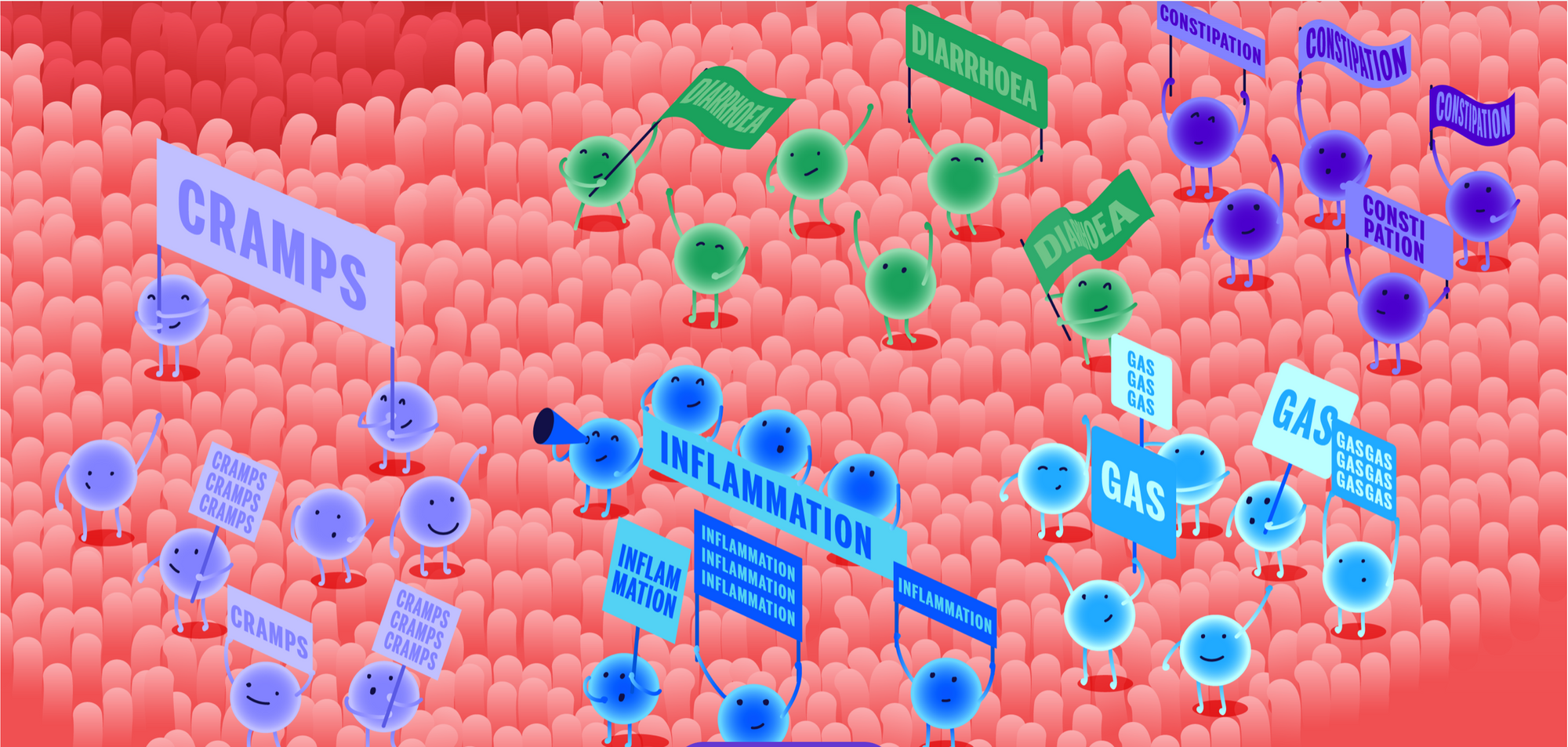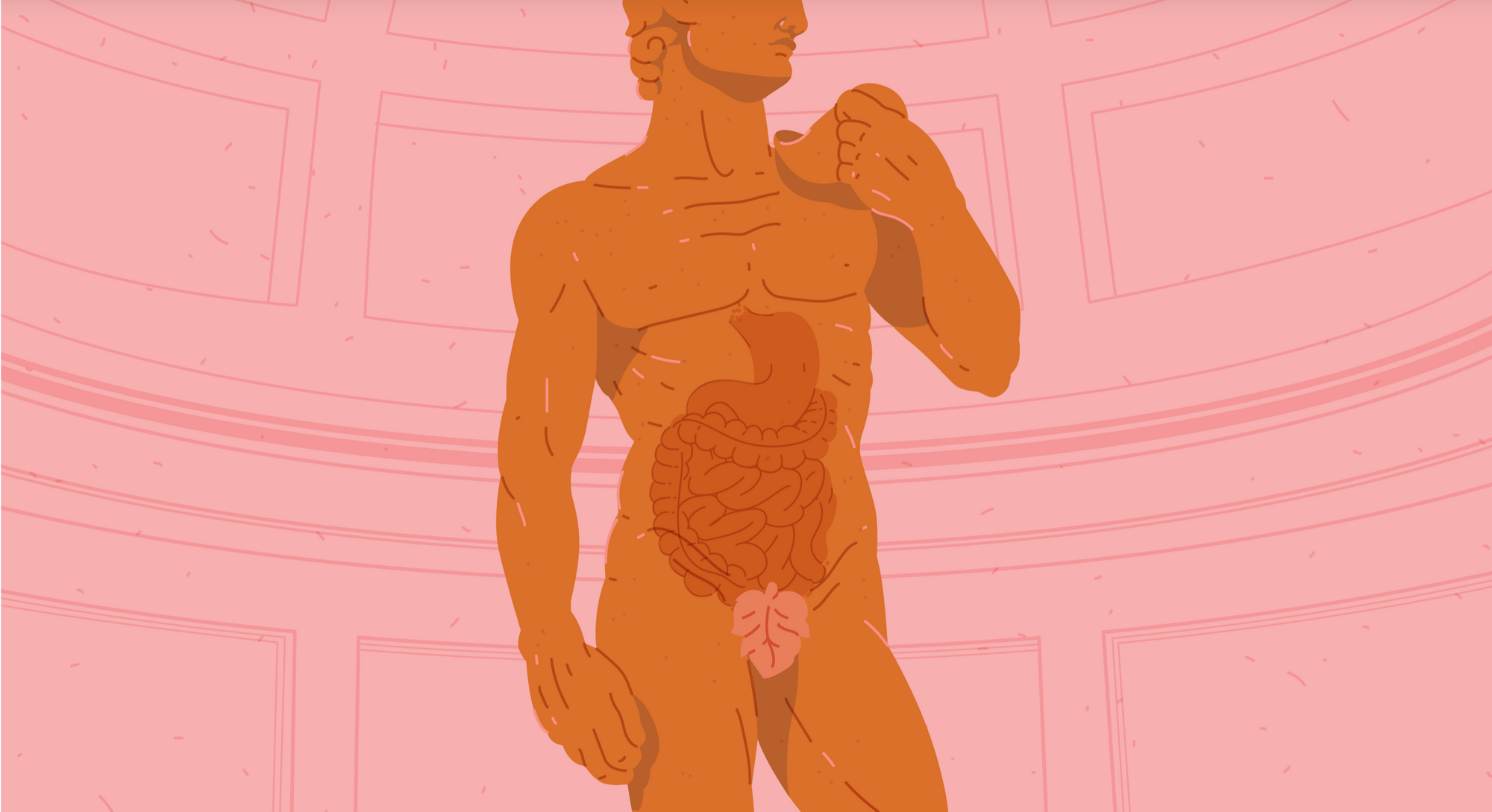Imbalances in the gut microbiome often accompany age-related diseases like Parkinson's and Alzheimer's. We explore the link between ageing and the microbiome, including its role in "inflammaging" and longevity.
Table of contents
- Immunosenescence and “inflammaging”
- Age-related diseases: is the microbiome involved?
- What causes age-related dysbiosis?
- Gut microbiome: the key to health and longevity?
- It pays to be different
- Top tips to combat age-related dysbiosis
- Article summary
Immunosenescence and “inflammaging”
As we age, the body undergoes numerous changes driven by genetics, lifestyle and environmental factors.
In particular, the immune system appears to deteriorate in later life (generally considered 65+), resulting in increased levels of inflammatory cytokines and reduced immune cell activity.
Most if not all age-related diseases have an inflammatory signature, leading to the development of the "inflammaging" theory.
According to this hypothesis, higher rates of arthritis, Parkinson's, Alzheimer's, osteoporosis and cancer in elderly populations are due to low-grade chronic inflammation resulting from an ageing immune system.
Age-related diseases: is the microbiome involved?
Like our human cells, the microbiome undergoes age-related changes in later life, generally declining in diversity and becoming increasingly unstable (dysbiosis).
In one study, researchers performed a colonoscopy on 251 subjects, ranging from 18-81 years old.
The researchers took microbiome samples from the lower small intestine (duodenum) to compare microbiome composition and diversity at different life stages.
Intriguingly, the microbiome composition of older patients was markedly different from the younger subjects, showing reduced diversity and enrichment in Escherichia and Klebsiella genera.
The microbiome plays a key role in the training, development and regulation of innate and adaptive immunity
Tellingly, dysbiosis accompanies many age-related diseases, with one study showing that frailty is associated with reduced microbiome diversity and enrichment in pathogenic microbes.
More specifically, the frail microbiomes contained higher levels of Akkermansia, Parabacteroidetes and Klebsiella.
Parallel to this, their microbiomes were depleted in commensal genera such as Faecalibacterium and Roseburia, two butyrate-producing bacteria with anti-inflammatory effects.
This likely explains the increased inflammatory markers in their blood, including I-L 6 and zonulin.
Putting the pieces together, researchers suspect that age-related dysbiosis could drive inflammaging and add to the cumulative effects of immunosenescence.
Whilst causation hasn't been established in humans, age-related dysbiosis in rodents has been directly implicated in "inflammaging".
In an elegantly designed study, researchers transplanted the microbes from old mice into young germ-free mice, which promoted inflammation in the small intestine and increased intestinal permeability.
☝Enjoying this article?☝ Subscribe to the Atlas blog to get notified when a new article is published!.
What causes age-related dysbiosis?

Alongside immune dysfunction, ageing brings physiological changes in the gastrointestinal tract, including reduced mucus production, slower gut motility and a weakened gut barrier.
These factors can collectively change the "weather" in the gut, reducing microbiome diversity.
Age-related dysbiosis is also driven by environmental and lifestyle changes associated with ageing.
For example, common medications for age-related diseases, such as antibiotics, statins and proton pump inhibitors, can disturb microbiome diversity and preclude the growth of commensal bacteria.
In the colonoscopic study mentioned earlier, enrichment of Klebsiella species in an older population was associated with medications alone, independent of disease or chronological age.
Increasingly, the elderly spend their later years in care homes or assisted living, meaning they get little to no exposure to younger individuals (or their microbes). Moreover, these environments are often highly sanitised to protect vulnerable residents.
This idea is supported by the Hadza people, one of the last hunter-gatherer tribes on earth. Unlike their industrialised counterparts, elderly individuals in the Hadza tribe gain microbiome diversity as they age!
It is hypothesised that their close contact with younger tribe members- and the surrounding biosphere- likely explains the difference.
☝Say hello to your little friends☝ Discover the diversity and balance of the bacteria in your gut with the Atlas Microbiome Test, including their inflammatory potential.
Gut microbiome: the key to health and longevity?

Longevity researchers have begun exploring the microbial composition of long-living people, including those over 100 years old.
Although the research is in its infancy, there appear to be unique microbial signatures among the world's longest-living people, suggesting microbes play a part in longevity and healthy ageing.
In one Chinese study , researchers compared the microbiomes of centenarians with a parallel group of 65-70-year-olds.
Another study published in the prestigious journal Nature sequenced the microbial DNA of 160 centenarians with an average age of 107!
Compared to people aged 85 to 89 and those between 21 and 55, the centenarians had higher levels of several bacterial species that produce molecules called secondary bile acids.
These compounds are believed to protect against pathogenic species and regulate our immune response.
In lab studies, the compound strongly inhibited the growth of multiple pathogens, particularly Clostridium difficile, an antibiotic-resistant species that causes severe diarrhoea.
When mice infected with C-diff were supplemented with the molecule, it also reduced the pathogen levels.
Essentially, isoalloLCA could act like a natural precision antibiotic in the guts of centenarians, pacifying pathogenic species and maintaining immune homeostasis.
By doing so, secondary bile acids could protect centenarians against immunosenescence and minimise inflammaging.
☝Study spotlight☝ In a study at Stanford University, a 10-week diet high in fermented foods was shown to increase microbiome diversity and improve immune response. It should be noted that fermented foods can be harmful to those who are immunocompromised.
It pays to be different

When Akkermansia nibbles the gut lining, it stimulates mucin production, reinforcing the intestinal wall and combating inflammation.
Interestingly, the opposite seems true in older populations, where enrichment in Akkermansia is positively associated with inflammation. So what's going on?
It is hypothesised that although Akkermansia can strengthen the gut barrier by eating mucus during early life stages, age-related reductions in mucus production make them pathogenic later in life.
As such, a healthy microbiome at 80 likely looks different to a healthy microbiome at 20.
This idea is supported by a study funded by the National Institute of Ageing, published in the journal Cell Metabolism.
As part of the study, researchers analysed gut microbiome samples from 9000 individuals aged 18 to 101. In particular, they paid close attention to a longitudinal study looking at 900 older individuals (65+) to better understand the mature microbiome.
The results show that ageing triggers unique changes in the microbiome, correlating to health outcomes in later life.
Whilst no two microbiomes are alike in adulthood, we share about 30% similarity on average.
Bacteroidetes and Firmicutes are the most common phyla, with bacteria from these representing as much as 90% of your microbiota.
Beginning at 40, the dominant species in the microbiome begin to decline, whilst less common species expand. As a result, the ageing microbiome grows increasingly unique, and the more distinct, the better.
Those with the most "unique" biomes had better mobility, took less medication and could walk faster than their less unique counterparts.
In animal studies, mice given indoles have been shown to be more mobile and resistant to illness than a control group. They likely work by reinforcing the integrity of the gut lining and minimising inflammation.
Phenylacetylglutamine is found in high concentrations in the guts of Italian centenarians, leading some to hypothesise it could contribute to longevity.
The healthier populations in this study also saw a sharp decline in bacteroidetes, another mucus-degrading microbe.
As we mentioned earlier, the weakened intestinal lining in elderly populations can be compromised, as opposed to strengthened, by these formerly helpful microbes.
In short, a healthy microbiome in later life is one that ages like a fine wine, growing in uniqueness. On the contrary, a microbiome that fails to adapt to age-related changes may accelerate immunosenescence.
☝Did you know?☝ Intermittent fasting has been observed to increase mucus degrading bacteria, as these thrive during periods of food scarcity.
Top tips to combat age-related dysbiosis
In the future, researchers hope to develop tailored probiotic cocktails (synbiotics) which could tackle age-related diseases via the gut microbiome.
A few clinical studies have been conducted already, although the results are mixed, with many studies finding no effect.
In the meantime, there are plenty of steps you can take to boost microbiome diversity, nourish beneficial bacteria and alleviate age-related decline in the gut:
1.) Eat plenty of fibre
Fibre can improve bowel movements, help regulate blood sugar and feed beneficial bacteria in your gut. National health guidelines recommend that you eat 30g daily, although the more you eat, the better!
Chicory root, Jerusalem artichoke, ginger, garlic and bananas are all powerful prebiotics, acting like fertiliser for good gut bugs which can nourish your gut lining. Make sure to gradually increase your fibre intake to avoid digestive upset such as bloating.
2.) Follow the Mediterranean diet
The Mediterranean diet is the best-evidenced eating plan out there, with numerous clinical trials showing it can support cardiovascular, metabolic and cognitive health.
According to a study published in the British Medical Journal, high adherence to the Mediterranean diet can potentially promote healthier ageing via changes in the gut microbiome.
Twelve months on the MedDiet enriched an elderly population's microbiomes in taxa linked to lower frailty, improved cognitive function and reduced inflammation.
3.) Eat the rainbow (no, not Skittles!)
Fruit and vegetables get their distinct colour and aroma from plant chemicals called phytonutrients. Each colour is roughly correlated to specific health benefits, meaning the more colourful your diet, the better!
4.) Use antibiotics judiciously
Broad spectrum antibiotics do not distinguish between good and bad bacteria, which can cause collateral damage and temporarily reduce microbiome diversity.
In the vacuum left by antibiotics, opportunistic bacteria such as c.difficile can multiply and thrive. With this in mind, be judicious in your antibiotic use.
If you are taking antibiotics for a prolonged period, postbiotic supplements may be able to help your microbiome bounce back from disruptions. Your GP can advise you on which, if any, probiotics to take.
5.) Stay active
Active individuals tend to have more diverse microbiomes and higher levels of butyrate-producing bacteria.
You don't need to run a marathon to reap the benefits, either- gardening, walking and cycling are great ways to get your heart rate up.
Article summary
In a rush? Not to worry, here are the key points:
- The body undergoes multiple changes as we age, driven by genetics, lifestyle and environmental factors.
- The immune system deteriorates in later life, reducing immune cell activity and increasing inflammatory cytokines- a process called immunosenescence.
- According to the "inflammaging" theory, immune dysfunction increases the body's inflammatory load and contributes to age-related diseases such as Alzheimer's, osteoporosis, cancer and Parkinson's.
- Disruptions to the microbiome accompany most if not all age-related diseases. What's more, dysbiosis is associated with increased frailty in ageing populations.
- It remains unclear whether age-related disease triggers dysbiosis or vice versa, although it likely works in both directions.
- Healthy older adults possess unique microbiome profiles, suggesting the gut microbiome may contribute to longevity.
- Increased diversity and enrichment in butyrate-producing bacteria are linked to healthy ageing and longevity, as is an increasingly unique microbiome profile.
- A microbiome that produces specific bile acids may protect centenarians against pathogenic bacteria.
- A healthy microbiome in later life appears to adapt to age-related changes, including reduced mucus production and slower intestinal motility.
- Eating a diet rich in prebiotic fibre, experimenting with probiotic foods, staying active and using antibiotics judiciously may be able to counteract age-related dysbiosis.

☝️DISCLAIMER☝This article is for informational purposes only. It is not intended to constitute or be a substitute for professional medical advice, diagnosis, or treatment.






















